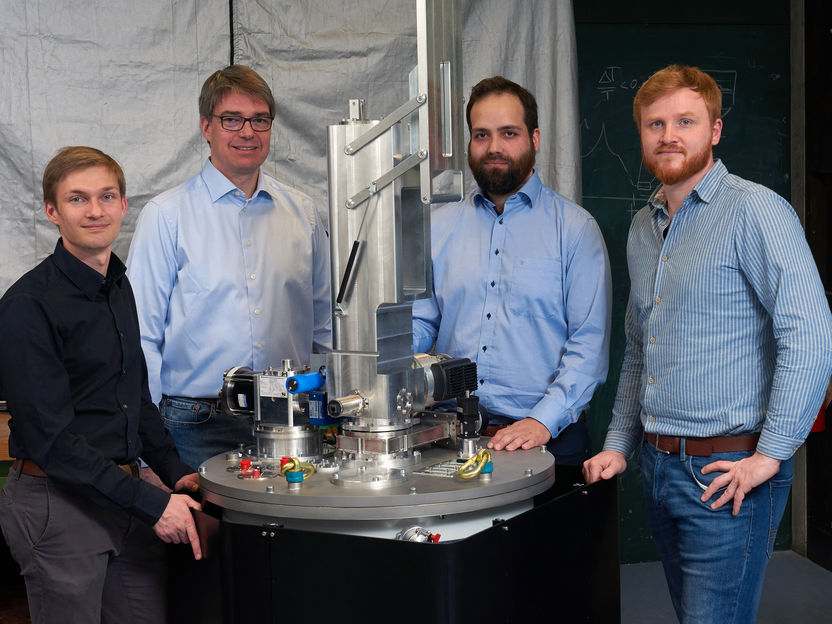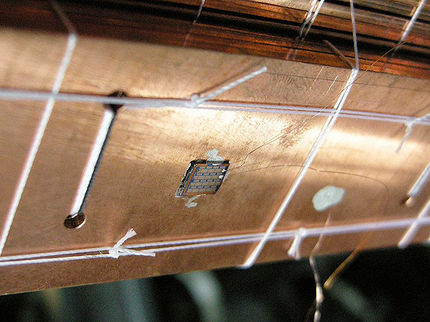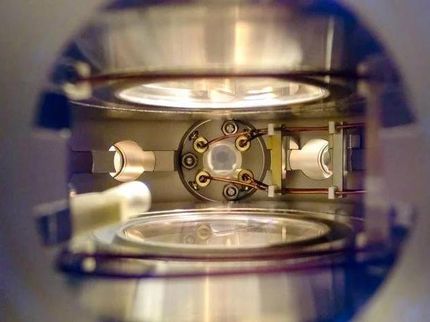Spin-off develops magnetic cooling system for extremely low temperatures
Cooling for quantum electronics
Advertisement
The start-up kiutra is the first company in the world to have succeeded in developing a permanent magnetic cooling system to reach temperatures close to absolute zero. Such temperatures are, for example, required for the operation of quantum computers. The system was set up by a team of researchers from the Physics Department at the Technical University of Munich (TUM).

Alexander Regnat, Prof. Christian Pfleiderer, Jan Spallek and Tomek Schulz with their cooling system for extremely low temperatures.
W. Schürmann / TUM
Low temperatures are essential for basic research in the field of quantum physics. More and more technologies based on quantum mechanics are now also making the leap from the laboratory to commercial applications.
High-sensitivity detectors and quantum computers are two well-known examples. However, very low temperatures close to absolute zero (around -273°C) are generally required for the operation of sensitive quantum technology. Demand for effective cooling solutions is therefore rapidly growing.
TUM researchers Alexander Regnat, Jan Spallek, Tomek Schulz and Prof. Christian Pfleiderer are seeking to meet that demand. All four are currently working on their prototype at the TUM Physics Department. According to Alexander Regnat, there is already the prospect of taking on more staff and setting up separate headquarters.
The team of scientist came up with the idea during their work at the TUM. Again and again, they were faced with the limits of conventional methods for reaching such low temperatures. The group therefore developed its own technology to ensure permanent cooling and founded kiutra GmbH in the summer of 2018.
Magnetic cooling
Liquefied gases are usually used to generate very low temperatures. Where constant temperatures close to absolute zero are needed, the extremely rare and expensive isotope helium-3 has to date been used. There are magnetic cooling processes, which can generate the requisite temperatures using inexpensive solids – but usually only for a limited period of time.
Concepts for permanent magnetic cooling have been around for many years. "However, technical implementation is extremely challenging and this has previously prevented the development of a product for widespread use," explains Tomek Schulz.
"We are the world's first commercial supplier of a cooling system that can magnetically achieve temperatures close to absolute zero ( near -273°C) on a permanent basis," says Alexander Regnat. "Our great advantage is that we do not need expensive helium-3. All we need is electricity."
Other news from the department science
Most read news
More news from our other portals
Something is happening in the chemical industry ...
This is what true pioneering spirit looks like: Plenty of innovative start-ups are bringing fresh ideas, lifeblood and entrepreneurial spirit to change tomorrow's world for the better. Immerse yourself in the world of these young companies and take the opportunity to get in touch with the founders.

































































